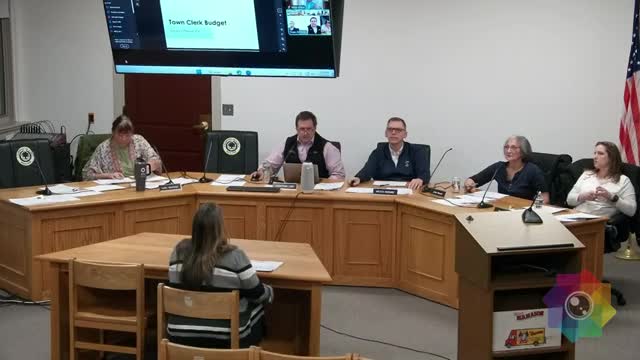Millis town clerk presents staffing plan, mail‑in ballot surge and possible charter change
Get AI-powered insights, summaries, and transcripts
Subscribe
Summary
Interim Town Clerk Cathy Smith updated the Finance Committee on rising mail‑in ballot demand after a state law change, an uncertain charter change that could make the clerk appointed rather than elected, and the office’s FY26 staffing and training requests.
Cathy Smith, interim Town Clerk for the Town of Millis, told the Finance Committee on March 12 that demand for mail‑in ballots has jumped since a 2022 change to Massachusetts law and that the clerk’s office is budgeting for either continued elected staffing or transition to an appointed clerk, depending on outcomes of pending Select Board and town meeting actions.
Smith and deputy Deirdre Gilmore described a rapid expansion of mail‑in ballot requests: the town mailed about 3,325 ballots for the 2024 presidential election and received approximately 2,500 back. Smith said the increase followed a change to Massachusetts General Laws, Chapter 54, Section 25, under which all registered voters receive a state postcard asking whether they want a mail‑in ballot; if a voter checks “all elections,” local contests are included in ballot mailings.
The clerk’s budget proposal includes a 40‑hour week department head town clerk and a 30‑hour assistant clerk — an increase of 12.5 hours from the prior year — to cover the heavier workload during election seasons and to maintain office functions while the clerk’s status remains in flux. Smith said she and town staff will present a warrant article to town meeting and, if approved by voters, the change would also require a special act by the Legislature and signature by the governor; the Select Board planned to discuss placing a question on the May ballot.
Why it matters: Smith said the office needed more staff hours because mail‑in ballots and early voting create additional processing steps and recordkeeping; she said the town receives partial state grant reimbursement for mail‑in and early‑voting costs but not all expenses are covered. The clerk’s office also seeks funding for voter outreach (high‑school registration drives and senior education), staff training, and improved records filing, including a long‑term goal of digitizing planning, zoning and town records for easier public access.
Town meeting process items: Smith told the committee the Select Board had not yet made a final determination on whether to put an appointed‑vs‑elected question on the May ballot; if the warrant article and ballot measure both pass locally, the town would still need the Legislature’s special act to enact the change, a process likely to take about a year.
Other requests and pilot projects: The clerk’s presentation listed consideration of town meeting “clickers” (handheld voting devices) to speed counting and improve accuracy at indoor town meetings. Vendors quoted rental or purchase examples; Smith said leasing or renting for a single event could be far less expensive than purchase, but she had not yet placed a budgeted figure in the FY26 request because pricing and community acceptance were still under review. She also said the office intends to pursue state grants for durable early‑voting equipment or additional precinct machines if population growth requires added precincts.
Ending: The Finance Committee members asked for more detail on grant reimbursements and on budget lines that depend on whether the clerk remains elected or becomes appointed. Smith said unused funds under either scenario would return to town free cash if not expended and pledged to provide updated grant figures and cost estimates at a future meeting.
